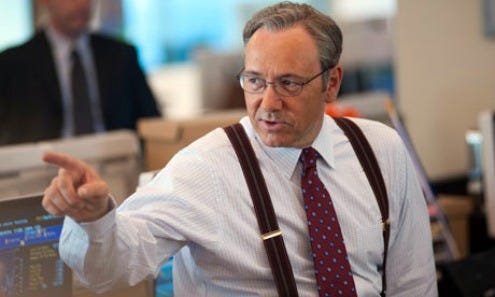Margin Call

At the beginning of "Margin Call," we meet a man we think must surely be the most loathsome creature ever to roam the Earth.
Sam Rogers is the head of the New York branch of a huge corporation that has just laid off 80 percent of its stock traders. Though he weeps openly for his dog dying of liver cancer, he spares not a moment's thought for the dozens of human lives he has just thrown into turmoil. Rallying the remaining troops, even forcing them to applaud themselves, Sam gives a speech:
"They were good people and they were good at their jobs. But you were better. Now they're gone. They are not to be thought of again."
Turns out Sam is the hero and moral conscience of this story.
Sam is played by Kevin Spacey, who has a gift for portraying men lacking a moral compass. But as a devoted company man with 34 years of loyalty, even Sam is repulsed by what his bosses ask him to do to save the firm. Not because he's opposed to cutting throats when necessary, but because he's been around long enough to know if you slit too many of your customers' throats, nobody will buy from you again.
This edgy, terrific indie drama comes from first-time writer/director J.C. Chandor, making the sort of debut that bellows at the arrival of a major new talent.
He's helped, of course, by a dream cast that includes not only Spacey but Jeremy Irons, Zachary Quinto, Demi Moore, Paul Bettany, Simon Baker and Stanley Tucci. It would be easy to say that it's hard to screw up with a cast like that, but plenty of other films have had the talent but not the tools — solid storytelling — to bring it all together.
"Margin Call" does.
It's set about three years ago, at the beginning of the Great Recession, and the company in question is a not-too-thinly veiled reflection of Lehman Brothers. A century-old firm known for never losing money on a deal, it calculates debt and risk on home mortgages like chips in a massive pile on a poker table, never considering that these are real people with real futures at stake. Until, that is, their cards come up wrong.
Chandor doesn't get too far into the thickets on the specifics of the bad debt that threatens to tip the company over. His film is more concerned with the personalities involved in rationalizing the sort of insane gamble that seemingly conservative firms took in pursuit of ever more profit.
Things get rolling when Eric Dale (Stanley Tucci), a senior risk analyst, is among those who get the axe. He's been working on something big, and before he takes his last walk out the door — escorted by a beefy security goon — he passes his findings on to a young hotshot, Peter Sullivan (Quinto).
Peter quickly puts it all together and alerts his boss, who calls in Sam, who brings in his superior, and so on. It all plays out in the middle of one night, with ever-bigger executives flying in on the company helicopter. Just when you think the newest one is the worst yet, another guy swoops in (literally) to do him one better.
Bettany is very good as Will Emerson, Sam's number-two guy who's closer in age to the young guns like Peter but puts even Sam's cold-eyed calculations to shame. Will is utterly loyal to Sam ... as long as the percentages favor him.
John Tuld (Irons) is the last to arrive and makes the biggest show of ruthlessness. If his underlings are willing to make other individuals suffer to earn the company a few dollars more, the CEO will happily flush all of Wall Street down the drain, as long as it's his hand on the handle.
"It's just money. It's made up. Pieces of paper with pictures on it so we don't have to kill each other just to get something to eat," Tuld says.
With its tight bookends of a single location on one tumultuous night, and a pressure cooker of a business setting, "Margin Call" resembles a stage play. It reminded me very much of "Glengarry Glen Ross" (in which Spacey also starred), about a bunch of real estate salesmen under the gun.
The difference is that "Margin Call" takes place about 15 spaces up the corporate ladder, where the suits are much more expensive and the guns are big enough to blow a hole in the entire financial system.
4.5 Yaps

